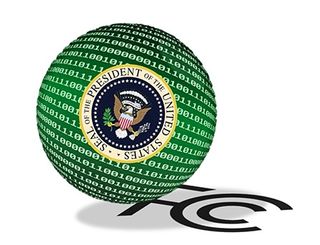GOP Claims Obama Rolled FCC on Title II

It has been three months since Internet Service Providers made their case against the FCC’s Title II reclassification of Internet access service, so a court decision could come anytime. But the chairman of the Senate government oversight committee was making his own case last week against the process that produced the rules.
One of the arguments cable and other ISPs made in challenging Title II was that the FCC had switched from a Sec. 706-based approach without putting that change out for comment.
Sen. Ron Johnson (R-Wis.) agrees, and thinks he has the evidence to back it up. FCC chairman Tom Wheeler says the process was the same as in other FCC administrations, adding that communication with the White House was not unusual.
Last week, after a year-plus investigation, Johnson, chairman of the Senate Homeland Security and Government Affairs Committee, released a report titled, Regulating the Internet: How the White House Bowled Over FCC Independence. He believes it shows that the White House used undue influence to override the FCC decision-making process and push it toward Title II, a move cable operators have said depressed investment and allowed the commission to regulate various practices under a vague, know-it-when-we-see-it standard.
Wheeler had always indicated Title II was a possibility, as had his predecessor, Julius Genachowski. But Genachowski had ultimately chosen the Sec. 706 route, and Wheeler had signaled a hybrid version of buttressing open Internet rules after his predecessor’s attempt was remanded back to the FCC by a federal appeals court for better legal underpinning.
The president came out very publicly for Title II in an online video, and the chairman appeared to follow his lead, changing course and moving to that Title II model.
“This investigation has convinced me that the White House overrode the FCC’s decision-making apparatus,” Johnson said last week in releasing the report. “It is concerning that an independent agency like the FCC could be so unduly influenced by the White House, particularly on an issue that touches the lives of so many Americans and has such a significant impact on a critical sector of the United States economy.”
Broadcasting & Cable Newsletter
The smarter way to stay on top of broadcasting and cable industry. Sign up below
Johnson says that not only did his report prove the FCC changed course and “executed the President’s preference,” but that FCC staffers raised concerns about whether the FCC had followed proper notice and comment procedures as required by law.
Johnson’s office said his report also showed that, “Immediately after the president’s statement, FCC staff expressed confusion as edits were suddenly delayed and the rapid timetable for completing the draft Open Internet Order was ‘paused.’ At the conclusion of the pause, Wheeler instructed FCC staff to change course and draft an order that would follow the President’s proposal of a Title II reclassification.”
One email from a staffer working on the Open Internet order reads: “Chris and Rosemary just alerted me to breaking news: ‘Obama says to make it Title II’....Not sure how this will affect the current draft and schedule, but I suspect substantially.”
As to not putting out the sudden shift for public comment, “Specifically, the FCC’s career professional staff advised that the record to support Title II reclassification for both fixed and wireless broadband was thin and needed to be bolstered. Despite this recommendation, the FCC chose not to seek additional public comment, and proceeded with the president’s preferred policy outcome,” said Johnson’s report.
The criticisms of the process by Republicans, who opposed Title II, are not new, and were addressed by Wheeler in a House government oversight hearing on the issue almost a year ago (to see it, go to broadcastingcable.com/March7).
Wheeler addressed them again in a Senate oversight hearing last week, during which he was grilled by Johnson himself. The chairman said the FCC had not circumvented the ex parte notification requirement about communications with White House staffers. He also said that communications between the White House and independent agencies are not unusual, and are in fact typical. “The White House, Congress, and everybody,” Wheeler said, adding that other presidents have contacted FCC chairs, pointing to a meeting between former FCC chief Mark Fowler and President Ronald Reagan.
But there is precedent on the Democratic side for criticizing an FCC chair for alleging the public and stakeholders were not allowed sufficient input on a change in policy. Back in 2007, a prominent Democratic senator told then-FCC chairman Kevin Martin that he should have put out a new broadcast media ownership proposal for notice and comment. The senator: Barack Obama of Illinois.
Contributing editor John Eggerton has been an editor and/or writer on media regulation, legislation and policy for over four decades, including covering the FCC, FTC, Congress, the major media trade associations, and the federal courts. In addition to Multichannel News and Broadcasting + Cable, his work has appeared in Radio World, TV Technology, TV Fax, This Week in Consumer Electronics, Variety and the Encyclopedia Britannica.

